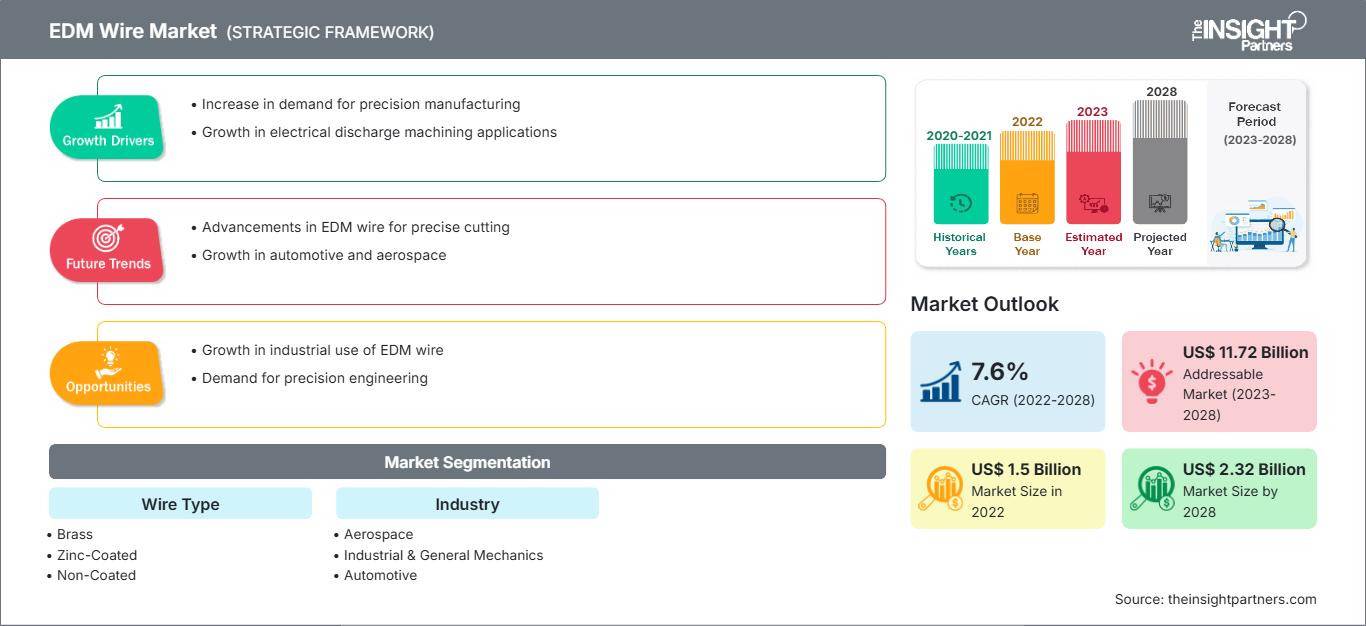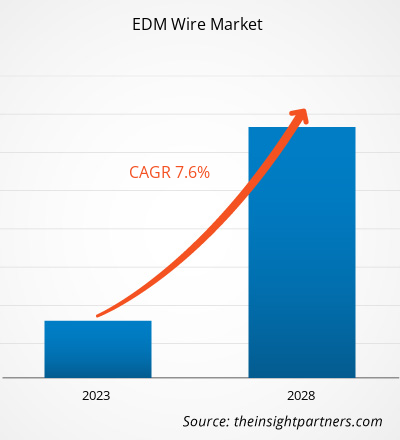Der Markt für EDM-Drähte soll von 1.497,50 Millionen US-Dollar im Jahr 2022 auf 1.497,50 Millionen US-Dollar wachsen, was einer durchschnittlichen jährlichen Wachstumsrate von 7,6 % zwischen 2022 und 2028 entspricht.
Die Automobilindustrie in Nordamerika wächst stetig und hat einen immensen Einfluss auf die Binnenwirtschaft. Diese Branche macht etwa 3 % des nationalen BIP der USA aus. Eine derart gut positionierte Branche benötigt kontinuierlich Zubehör und Komponenten für Automotoren, Fahrgestelle und andere Metallvorrichtungen, was auf die hohe Nachfrage nach Werkzeugmaschinenherstellern hindeutet. EDM-Drähte werden in dieser Branche für verschiedene Metallformanwendungen verwendet, beispielsweise zum Formen von Stahlscheinwerfern. Hersteller bevorzugen den Einsatz von EDM-Verfahren zum Formen und Bohren großer Automobilteile. Darüber hinaus wird erwartet, dass staatliche Initiativen zur Förderung von Investitionen in die Automobilindustrie die Nachfrage nach EDM-Drähten in den kommenden Jahren erhöhen werden. Laut The Frontier Hub erreichten die ausländischen Direktinvestitionen (FDI) in die US-Automobilindustrie im Jahr 2018 114,6 Milliarden US-Dollar. Im August 2021 unterzeichnete die US-Regierung außerdem eine Durchführungsverordnung, die ein neues Ziel von 50 % des Absatzes von Elektrofahrzeugen bis 2030 festlegt. Die Regierung hat außerdem 3 Milliarden US-Dollar zur Förderung der heimischen Elektrofahrzeugindustrie bereitgestellt. In Übereinstimmung mit diesem Plan kündigten GM Investitionen von 35 Milliarden US-Dollar und Ford von 30 Milliarden US-Dollar im Jahr 2025 an, um den Automobilsektor anzukurbeln. Darüber hinaus treibt ein Anstieg der Nachfrage nach Einrichtungsgegenständen, Haushaltsgeräten und Unterhaltungselektronik, einschließlich intelligenter und effizienter Küchengeräte, da viele Menschen in sich entwickelnde und wandelnde Vororte ziehen, das Wachstum des EDM-Drahtmarktes in der Region an.
Verschiedene Hersteller von Militär- und Verkehrsflugzeugen sind in Nordamerika stark vertreten, was das Land zum weltweit größten Luft- und Raumfahrtmarkt macht. Laut der Aerospace Industries Association (AIA) machte die Luft- und Raumfahrtindustrie 1,8 % des gesamten BIP der USA aus und trug 382 Milliarden US-Dollar zum BIP bei. Die Luft- und Raumfahrtindustrie in Nordamerika floriert aufgrund der positiven Aussichten für die Einführung neuer Technologien, des Vorhandenseins qualifizierter Arbeitskräfte, einer günstigen Wirtschaftspolitik und eines hohen BIP pro Kopf in den wichtigsten Volkswirtschaften der Region. Im April 2021 kündigte das US Space and Missile Systems Center Investitionen in Höhe von 191 Millionen US-Dollar, 240 Millionen US-Dollar bzw. 253 Millionen US-Dollar in Boeing, Lockheed Martin Corporation und Northrop Grumman Corporation an, um Nutzlastprototypen für das Protected Tactical Satcom-Programm der US Space Force zu entwickeln. Somit hat die wachsende Luft- und Raumfahrtindustrie das Potenzial, den nordamerikanischen Markt für EDM-Drähte in den kommenden Jahren anzukurbeln.
EDM-Drähte werden bei der Herstellung von Geräten der Unterhaltungselektronik, der Automobilindustrie, medizinischer Geräte und verschiedenen anderen Anwendungen verwendet. Der US-Automobilsektor wächst aufgrund steigender Automobilverkäufe, zunehmenden Kapitalwachstums und höherer Exporte schnell. Daher ist die Nachfrage nach EDM-Drähten sehr hoch. Automobilhersteller haben eine bedeutende Marktinitiative ergriffen und das Wachstum des EDM-Drahtmarktes im Land angekurbelt. Große Automobilhersteller kündigten milliardenschwere Investitionen in Elektro- und Nutzfahrzeuge an. Die Präsenz von Herstellern wie Oki Electric Cable Co., Ltd. und Hitachi Metals America, Ltd. fördert das Wachstum des EDM-Drahtmarktes zusätzlich.
Passen Sie diesen Bericht Ihren Anforderungen an
Sie erhalten kostenlos Anpassungen an jedem Bericht, einschließlich Teilen dieses Berichts oder einer Analyse auf Länderebene, eines Excel-Datenpakets sowie tolle Angebote und Rabatte für Start-ups und Universitäten.
Markt für EDM-Draht: Strategische Einblicke

-
Holen Sie sich die wichtigsten Markttrends aus diesem Bericht.Dieses KOSTENLOSE Beispiel umfasst Datenanalysen, die von Markttrends bis hin zu Schätzungen und Prognosen reichen.
Auswirkungen der COVID-19-Pandemie auf das Wachstum des nordamerikanischen EDM-Drahtmarktes
Die USA waren aufgrund der COVID-19-Pandemie das am stärksten betroffene Land in Nordamerika. Aufgrund der strengen Vorschriften, die die US-Regierung im zweiten Quartal 2020 erließ, wurden die Lieferkette sowie der Import und Export unterbrochen. Infolgedessen wurden die meisten Produktionsstätten vorübergehend geschlossen oder arbeiteten mit minimaler Belegschaft. Die Automobilindustrie, die Fertigungsindustrie und viele andere Branchen waren im Jahr 2020 negativ betroffen. Sobald die globale Lieferkette jedoch wieder in Gang kam, begann der EDM-Drahtmarkt zu wachsen. Die US-Automobilindustrie ist eine der größten Branchen weltweit. Im ersten Quartal 2022 begannen die Fabriken aufgrund der gestiegenen Nachfrage nach Produkten ihre Produktion zu steigern, was den Bedarf an EDM-Draht ankurbelte.
Markteinblicke – Markt für EDM-Draht
Geografisch ist der Markt für EDM-Draht hauptsächlich in Nordamerika, Europa, Asien-Pazifik (APAC), Naher Osten und Afrika (MEA) sowie Südamerika (SAM) unterteilt. Der Asien-Pazifik-Raum hatte 2021 den größten Marktanteil und wird seine Dominanz im Prognosezeitraum behalten. Außerdem wird die Region im Prognosezeitraum voraussichtlich die höchste durchschnittliche jährliche Wachstumsrate (CAGR) im globalen Markt für EDM-Draht verzeichnen. Die Akteure des APAC-Marktes für EDM-Draht verzeichnen ein starkes Wachstum der Nachfrage nach EDM-Draht.
Der Asien-Pazifik-Raum dominiert 2021 den Markt für EDM-Draht, wobei China gemessen am Marktanteil voraussichtlich dominieren wird. Die Elektronikindustrie macht 20–50 % des gesamten Exportwerts Asiens aus. China ist der weltweit größte Hersteller von elektronischen Geräten, darunter Fernseher, DVDs und Mobiltelefone. Laut Nikkei Inc. arbeitet die chinesische Regierung an verschiedenen Plänen und investiert bis 2023 327 Milliarden US-Dollar, um den heimischen Elektronikmarkt zu erweitern. Auch die indische Regierung arbeitet am Ausbau der Elektronikindustrie. Laut dem Ministerium für Elektronik und IT erreichte die Inlandsproduktion von Elektronikgütern in Indien im Jahr 2020 einen Umsatz von 74,7 Milliarden US-Dollar, was einer durchschnittlichen jährlichen Wachstumsrate von 17,9 % entspricht. Dies ist auf die Initiativen der Regierung und die Bemühungen der Industrie zurückzuführen. Zu den Regierungsmaßnahmen im Zusammenhang mit der Elektronikfertigung gehören die Production Linked Incentive (PLI)-Programme, das Programm zur Förderung elektronischer Komponenten und Halbleiter sowie das Programm Modified Electronics Manufacturing Cluster (EMC 2.0).
EDM-Draht
Regionale Einblicke in den EDM-DrahtmarktDie Analysten von The Insight Partners haben die regionalen Trends und Faktoren, die den EDM-Drahtmarkt im Prognosezeitraum beeinflussen, ausführlich erläutert. In diesem Abschnitt werden auch die Marktsegmente und die geografische Lage in Nordamerika, Europa, dem asiatisch-pazifischen Raum, dem Nahen Osten und Afrika sowie Süd- und Mittelamerika erörtert.
Umfang des EDM-Draht-Marktberichts
| Berichtsattribut | Einzelheiten |
|---|---|
| Marktgröße in 2022 | US$ 1.5 Billion |
| Marktgröße nach 2028 | US$ 2.32 Billion |
| Globale CAGR (2022 - 2028) | 7.6% |
| Historische Daten | 2020-2021 |
| Prognosezeitraum | 2023-2028 |
| Abgedeckte Segmente |
By Drahttyp
|
| Abgedeckte Regionen und Länder |
Nordamerika
|
| Marktführer und wichtige Unternehmensprofile |
|
Dichte der Marktteilnehmer für EDM-Draht: Verständnis ihrer Auswirkungen auf die Geschäftsdynamik
Der Markt für Erodierdrähte wächst rasant. Die steigende Nachfrage der Endverbraucher ist auf Faktoren wie veränderte Verbraucherpräferenzen, technologische Fortschritte und ein stärkeres Bewusstsein für die Produktvorteile zurückzuführen. Mit der steigenden Nachfrage erweitern Unternehmen ihr Angebot, entwickeln Innovationen, um den Bedürfnissen der Verbraucher gerecht zu werden, und nutzen neue Trends, was das Marktwachstum weiter ankurbelt.

- Holen Sie sich die Markt für EDM-Draht Übersicht der wichtigsten Akteure
Drahttypbasierte Erkenntnisse – EDM-Drahtmarkt
Basierend auf dem Drahttyp ist der EDM-Drahtmarkt in Messing, verzinkt und unbeschichtet segmentiert. Das Messingsegment hatte 2021 den größten Marktanteil. Der Draht bietet eine gute Bearbeitungsgeschwindigkeit und hohe Genauigkeit beim Schneiden des Metalls. Die hervorragende Geradlinigkeit des Drahtes bietet außerdem eine verbesserte automatische Einfädelfähigkeit, was die Nachfrage nach Messing-EDM-Draht auf dem Markt ankurbelt.
Die Akteure auf dem EDM-Drahtmarkt konzentrieren sich hauptsächlich auf die Entwicklung fortschrittlicher und effizienter Systeme. Zum Beispiel:
- Im Jahr 2020 brachte Makino die U6 HEAT Extreme auf den Markt, eine neue Draht-EDM-Maschine. Sie wurde entwickelt, um die Bearbeitungsgeschwindigkeiten und die Effizienz auf ein neues Niveau zu heben. Kern dieser Lösungen ist die Verwendung eines großen Drahtes mit einem Durchmesser von –0,016“ (0,4 mm). Damit ist die U6 HEAT Extreme eine der schnellsten Drahterodiermaschinen.
- Im Jahr 2020 brachte OKI eine neue Serie von EDM-Drähten auf den Markt, Elektrodendrähte für Drahterodiermaschinen (WEDMs), die für alle Produkte eine Rundheit von 0,25 Mikrometern aufweisen. Sie werden in der Stanzformbearbeitung und anderen Prozessen eingesetzt.
- Historische Analyse (2 Jahre), Basisjahr, Prognose (7 Jahre) mit CAGR
- PEST- und SWOT-Analyse
- Marktgröße Wert/Volumen – Global, Regional, Land
- Branchen- und Wettbewerbslandschaft
- Excel-Datensatz
Aktuelle Berichte
Verwandte Berichte
Erfahrungsberichte
Grund zum Kauf
- Fundierte Entscheidungsfindung
- Marktdynamik verstehen
- Wettbewerbsanalyse
- Kundeneinblicke
- Marktprognosen
- Risikominimierung
- Strategische Planung
- Investitionsbegründung
- Identifizierung neuer Märkte
- Verbesserung von Marketingstrategien
- Steigerung der Betriebseffizienz
- Anpassung an regulatorische Trends






















 Kostenlose Probe anfordern für - Markt für EDM-Draht
Kostenlose Probe anfordern für - Markt für EDM-Draht